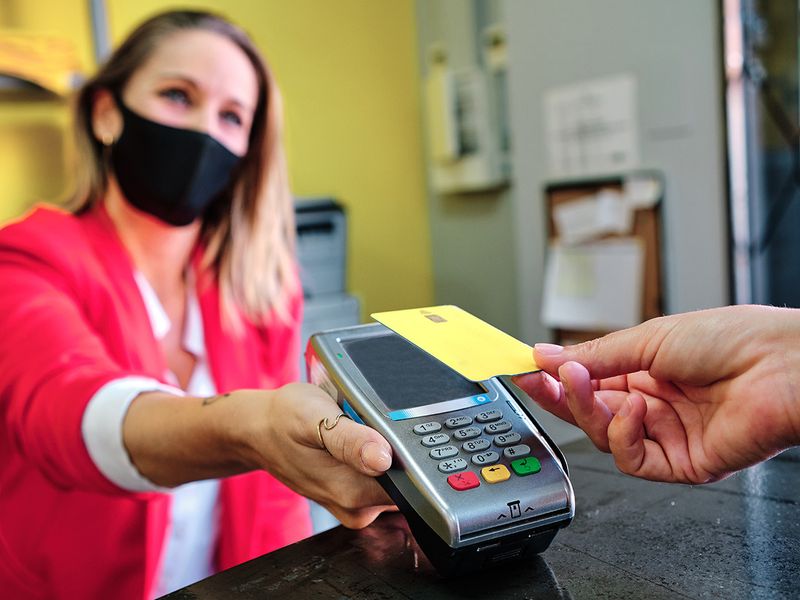
Dubai: Payment industry giants Visa and MasterCard are getting ready to raise credit card fees for retailers worldwide next month. But how much will fees be hiked and will it affect me as a shopper in any way?
The companies, according to a document obtained by The Wall Street Journal, will apply the increases to many online credit card purchases worldwide.
Global payment processors Visa Inc. and MasterCard Inc. are preparing to increase the fees that many large retailers pay when they accept shoppers’ credit cards.
MasterCard has been consistent at around 22 per cent of the market share across the past 5 years, while American Express has declined slightly from 22.85 per cent in 2017 to 18.99 per cent in 2020.
The global credit card payments market revenue was valued at $138.43 billion (Dh508.46 billion) in 2020, and is projected to reach $263.47 billion (Dh967.73 billion) by 2028, growing by 8.5 per cent yearly from 2021 to 2028.
Who will be most affected by this charge change?
Most of the increase will be for what is known as ‘interchange’ fees which go to the bank issuing the credit card and are not visible to shoppers. Though invisible to consumers, interchange fees are a constant source of annoyance for retailers, sellers or business owners.
But what are ‘interchange’ fees? When you buy something with a credit card, the seller pays a fee in order to accept that payment. Several parties get a cut of that fee, including the bank that issued your credit card.
This portion that goes to the card issuer is known as ‘interchange’, and it typically ranges from about 1 per cent to 3 per cent of your transaction amount, plus a flat fee.
‘Interchange fees’, sometimes called ‘swipe fees’ or ‘exchange fee’, are largely invisible to consumers, but they're worth knowing about because they help explain how your credit card rewards are funded. They may also affect a seller's pricing and, in some cases, whether your card is even accepted there.
Furthermore, credit cards provided by the banks help customers purchase different types of services on credit without having to put up cash at the point of sale.
Instead, the charges accrue as a balance that must be paid off on a monthly billing cycle, giving the buyer more time to get the cash together.

Why do interchange fees exist? Who sets interchange fees?
Processing payments comes with costs: Credit card companies have extensive systems in place to securely and safely collect money from consumers and send it to a merchant, and they charge for that service.
These companies also offer a variety of benefits to cardholders — including extended warranties, rental car insurance and credit card rewards — and interchange fees help fund those benefits.
Interchange rates are set by the payment networks that credit cards run on, including Visa, MasterCard, American Express and Discover.
Rates vary depending on many factors, including what kind of purchase it is, where you make it, what kind of retailer it is, what bank issues the card, what specific card you're using (such as rewards versus no rewards), and more.
While there are other fees that merchants pay for the privilege of making sales via credit and debit card, interchange fees are by far the largest, representing 70 per cent to 90 per cent of the total fees paid to banks by merchants.
Should I be worried of such a fee hike?
Reportedly, much of the current increase comes from this exchange fee. This is the fee charged by card-providing systems that retailers and business owners must pay when they accept credit card payments from buyers. This fee will then go to the bank that issued the card.
Even though it is ‘invisible’ to the buyer, the exchange fee is a concern to sellers and retailers. In recent years, the charges have increased as credit cards with rewards become more popular, but it is learned that they often have high fees to offset travel and other incentives.
Such charges have totalled an estimated $55.4 billion (Dh203 billion) for Visa and MasterCard in 2021, doubling the amount paid in 2012, according to a report from US-based Nilson, which publishes news and statistics on the global payment industry.
Although merchants, not cardholders, are charged interchange fees, the charges can still affect consumers or shoppers in a variety of ways. A retailer may, for instance, choose to embed the cost of those fees in the prices of its goods, in effect passing it along to customers.
What do such fees mean for cardholders?
Taking such charge hikes into consideration, the card issuer network has a policy of ‘accepting all cards’, Dubai-based retail consultants explain, meaning that once a buyer has accepted a certain type of credit card issued by one bank, it must also accept cards from all banks.
Some retail merchants or business owners, especially those that sell many lower-priced items, may require customers or shoppers to make a minimum purchase if they want to use a credit card, because it can help the merchant cover the interchange fee.
For example, if a customer purchases a Dh1 pack of gum and the merchant has to pay 40fils toward an interchange fee, the profits may be so low that it’s not worth selling the gum.
And in some cases, retailers or shop owners have even banned the use of certain credit cards, complaining that the interchange fees they're being charged to accept that plastic are too high.
The health crisis negatively impacted the credit card payments market, owing to limited consumer spending caused by rise in pay cuts and job losses across the globe.
In addition to this, ban on travel, closing of various restaurants worldwide and growing ban on essential and non-essential goods across the globe was adversely impacting the market growth.

How are interchange fees charged to business owners?
Card-issuing banks, payment processors (which may or may not be the issuing bank), credit card payment networks like MasterCard and Visa, payment gateways, and the merchant's own bank will all charge a percentage-based fee on every transaction.
But these charges frequently appear as a single, bundled amount on the bills your payment processor hands you. Even this is something of an oversimplification, however, since there are actually about 300 individual interchange fees composing the ‘single’ interchange fee you actually pay.
Can business owners reduce or avoid these fees?
Retailers or business owners can also lower their interchange fees by increasing security measures at the moment of payment and elsewhere.
Debit card transactions that are accepted without authentication information will process at a higher interchange rate because the transaction incurs more risk for the card network.
(All transactions incur interchange fees, including those made with debit cards. These charges, though, are generally lower than those made with credit cards. That's because there is less of a risk of loss to the card issuer as the system allows for the money to be withdrawn from the account right away.)
Some of these charge-related factors you can influence, but others you can't change. For instance, if you convinced your customers to buy more in-store than online, you could reduce your interchange fees.
Lowering your interchange fees may not result in more profit. By limiting your customers' choices, you could deter them from purchasing from your business.
Much to the relief of shoppers, in the UAE, a number of such card-related costs, which signify the largest cost for most retailers and business owners, are not passed to shoppers, as per law.
However, credit experts noted that the charges exist because all of the credit and debit card settlements are done outside of the UAE and then processed back to the issuing banks here.

Here are your 6 key takeaways from the upcoming possible fee hikes
1. Credit card companies charge retail merchants or business owners up to 4 per cent of every electronic transaction in interchange fees, which cover the costs of payment processing and mitigating fraud.
2. This fee doesn’t necessarily have dire consequences for large brands that generate enough revenue to offset these costs themselves. But small shops and independent businesses, whose net profit margins are dangerously thin, suffer under the additional weight of credit card processing fees.
3. Even the fast food industry – with the exception of some behemoths – sees overall net profit margins as low as 2 per cent worldwide.
4. For most businesses, the solution to credit card processing has been to pass those fees to consumers or shoppers paying with credit cards. But these ‘surcharges’ have historically been well concealed to the customer, who often doesn’t notice the additional charge until it’s been processed.
5. If you are a small business owner and want to avoid interchange fees, there's only one way to do it: Don't accept credit or debit cards. Depending on your industry, not accepting credit cards can hurt your bottom line even more than the fees.
6. However, interchange fees may be a fact of life for your small business – especially if you sell goods and services to the public, which expects the option of paying by plastic.
Bottom line: Beware of how these hikes affect you as a business owner and as a cardholder
Small businesses can cut down their credit card processing costs by setting a minimum credit card transaction amount. Credit card processing costs can add up if you sell many inexpensive items, especially for sales under Dh10.
Accepting payments in person can reduce this risk and lower your overall processing fees. Retailers get lesser the amount that is spent when consumers or shoppers pay with a credit card, and the amount taken by such fees has skyrocketed in the past decade.
In fact, these fees create a multiplier effect that drives inflation even higher and costs merchants and consumers or shoppers even more.
So retail and credit consultants also remind shoppers to be cautious when shopping – especially when deciding between whether or not to use your credit card, and use your debit card or cash instead.
Although the savings customers potentially make from limiting the use of cards, and in turn the higher fees that come along with it, will not be significant in the short run, financial planners reiterate how often these seemingly small costs add up over time.










